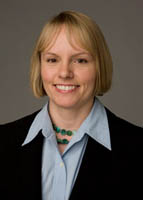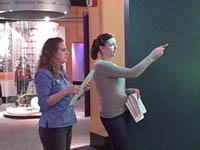Museum Puts Science Education Front and Center
An interview with Nicole Kowrach of the Museum of Science and Industry, Chicago
In March, Project 2061 launched its new “Using Atlas of Science Literacy in Informal Science Learning Settings” workshop at the Museum of Science and Industry in Chicago. The customized Atlas workshop is designed to help museum educators and staff to interpret their institutions’ exhibits and other resources through the lens of the national and state standards to which teachers and students are being held accountable. Project 2061 was pleased to partner with the Museum and to strengthen our mutual interests in science literacy for all.

-
Nicole Kowrach of the
Museum of Science and
Industry in Chicago
The workshop was presented by Project 2061 workshop leader Marlene Hilkowitz, Nicole Kowrach, Assistant Director for Education and Manager of School Programs at the Museum of Science and Industry, and Mary Ann Wojton, Senior Director of Student and Teacher Programs for the Center of Science and Industry (COSI) in Columbus, Ohio. Museum of Science and Industry educators were joined by colleagues from around the country, representing the Denver Museum of Nature and Science, the Denver Zoo, Washington University, the Saint Louis Science Center, the Adler Planetarium in Chicago, the Science Museum of Minnesota, and the State Arboretum of Virginia.
Workshop participants used Project 2061’s Benchmarks for Science Literacy and Atlas strand maps to analyze the Museum’s Genetics exhibit and to complete team studies of additional exhibits. They examined the learning experience offered by an exhibit, both in terms of the exhibit’s content focus and of how well that content is delivered to or accessed by the learner.
After the workshop, Project 2061 caught up with Ms. Kowrach to find out about the workshop and to get her perspective on how museums can best contribute to science teaching and learning.
Project 2061: You recently helped lead Project 2061’s first Atlas workshop designed especially for science center and museum staff. What was the most rewarding part of the workshop?
Kowrach: Project 2061 provides invaluable resources, especially the Benchmarks and Atlas, for anyone concerned with preparing our students for science literacy. By identifying key ideas, the connections between those ideas, and the ages at which students are most ready to learn them, these tools provide a framework for effective science instruction.
The Atlas serves as one of our primary program development tools here at the Museum of Science and Industry. During the recent Atlas workshop, it was especially rewarding to see educators from other informal science institutions have “aha!” moments about how they might use the Atlas, and to brainstorm together about the many ways the tools of Project 2061 can be used to build stronger, more effective exhibits and programs.
Project 2061: What was the most challenging part of the workshop?

-
Project 2061 workshop participants analyze an exhibit at the Museum of Science and Industry
Kowrach: The recent Atlas workshop marks the first time the materials were presented specifically for an informal science institution audience. During the planning phase, we spent considerable time talking about the differences between the formal and informal education worlds, and how the Atlas might be used in each setting. Of course we didn’t think of everything. But the ideas generated by the workshop attendees—all professionals in different areas of informal science education—provided us with great ideas for how to make the next workshop even more effective and relevant for this audience.
Project 2061: Could you give us an overview of your science education mission at the Museum of Science and Industry? Who are your main audiences?
Kowrach: The Museum of Science and Industry is taking a leadership role in the effort to improve science education. Our vision is to inspire and motivate our children to reach their full potential in science, technology, medicine, and engineering.
To help us realize this vision, we have three main strategies:
- Place educational programming at the heart of the Museum of Science and Industry experience by developing and expanding the Museum’s Center for the Advancement of Science Education (CASE).
- Provide spectacular, transformative exhibitions that grab attention and lead to learning.
- Enhance the experience of Museum guests by presenting a unique, dynamic visit that engages people in interactive science experiences that make learning fun.
As a result, the Museum is reaching out in new ways to students, teachers, the community, and school systems. CASE works with our local school systems—especially the Chicago Public Schools—and collaborates with some of the best minds and institutions focused on science and education. This collaboration makes the Museum a kind of “laboratory” for the development of science learning and teacher professional development programs.
CASE’s programming aims to shape how minority upper elementary and middle school students think about and participate in science. The short-term goal is to increase awareness, interest, and participation in science. Longer-term goals include influencing youth to choose STEM careers, sustaining a supportive climate at the community level for science engagement and participation, and facilitating high-quality science teaching and learning in schools. It’s a multifaceted approach that engages students, teachers, community organizations, and families at a community-wide level.
Project 2061: Is there an exhibit that’s been especially engaging and led to learning? What makes it work?
Kowrach: The Museum’s U-505 Submarine exhibit houses the only German U-boat captured during World War II and one of only five U-boats left in the world. The exhibit immerses visitors in the story of the submarine’s capture, science, and technology through more than 200 artifacts, archival footage, veteran testimony, recreated events, and interactive challenges—such as a dive trainer, periscope, code-breaking device, and more—designed to teach the science of submarines.
This exhibit is particularly engaging because it makes science relevant by placing it in a real-world context. Related programs for school groups provide additional science content. There's even an interesting science lesson at the end of the exhibit, where guests learn how the U-505 arrived in Chicago and crossed a busy highway to its first home at the Museum, and then watch a video and learn the science of how the sub was moved to its current below-ground exhibit hall in 2004.
Project 2061: What resources and activities does the museum’s Institute for Quality Science Teaching provide?
Kowrach: The Institute for Quality Science Teaching (IQST) provides professional development workshops that allow teachers to explore science topics linked to their curriculum and return to the classroom with new ideas, greater confidence, and the resources they need to make science engaging for their students.
About 1,000 teachers attend IQST programs each year, ultimately impacting science education for an estimated 30,000 students annually.
Project 2061: What’s ahead for teacher education at the museum?
Kowrach: Through the Institute for Quality Science Teaching, the Museum is becoming an integrated component of the support systems available to improve the quality of science teaching in our schools. The long-term goal of the Institute is to improve student performance in science by helping teachers utilize inquiry-based and hands-on/minds-on science curriculum both within and outside of the classroom setting.
By focusing on teachers’ science content knowledge, enhancing instructional practice, and developing their museum skills, IQST will serve as place for teachers to build their competencies in science and teaching strategies and establish the foundation for science literacy. As we continue to explore additional science topics, we will have a menu of topics and wide range of materials to assist the greater teacher audience in using the Museum’s exhibits and resources to support their students’ learning.
# # #
Project 2061 would like to thank the Museum of Science and Industry in Chicago for hosting the March workshop. We are also grateful to Mary Ann Wojton and COSI Columbus for hosting a June 2008 workshop that brought together a diverse group of educators from informal science institutions (ISIs). This group provided valuable feedback on the original Atlas workshop for K–12 science educators and recommended specific changes based on the unique needs of ISIs.
Development of the new “Using Atlas of Science Literacy in Informal Science Learning Settings” workshop was funded by a grant from AAAS’s William T. Golden Endowment Fund for Program Innovation.
Learn about Project 2061’s upcoming workshop offerings.
For more information about Project 2061’s partnerships with informal science institutions, please contact:
Communications Director: Mary Koppal, (202) 326-6643
Also in the March/April 2009 issue:




